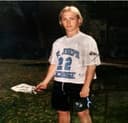Here's how it started for me:
“Legs, lever! Legs, lever!” These words, articulated with progressive rhythm and spirit, echoed through my head. Throughout junior high school, Saturdays were reserved for watching my brother fiercely exert himself as part of a machine to outrace another boat. The narrow, murky river, barely wide enough for two boats, was occupied by the sleek crafts, both struggling to gain millimeters with each stroke. My family’s unwavering support for my brother in his rowing endeavors and their enthusiasm for me to pursue a similar path left me with a pivotal decision. Did I want to join this “cult” and assimilate into the rigorous and relatively unknown world of crew? I became a coxswain, steering, directing, and inspiring the athletes as they propelled the boat toward victory.
At the end of my second novice season as a coxswain, our team traveled to the Scholastic Midwest Championship regatta. Here, we battled against high school crews over 1,500 meters of a 6-lane buoyed course. It was our end-of-season regatta, and tensions among the team and coaching staff were at an all-time high. Sunday, May 14th, marked the final race for the Men’s Novice 8+ category and the culmination of New Trier’s rowing efforts. As a unit, we had set a lofty goal: to be the first to win this event in a decade. Lingering just before the beginning of the course, waiting to be marshaled through to the start, waiting to expend themselves with all their might, were six boats of eight oarsmen. Everyone was uneasily peeking from side to side to glance at their competitors. Our boat was a vibrant blue, rough but smooth, old but reliable. The weather on race day was overcast and windy; an overall ominous mood prevailed, which created perfect conditions for a brawl.
I intently inspected the eight rowers in front of me and the nine people to my left side. There was a sense in the air that everyone knew these next five minutes were what they had been waiting for and training for the last year. The countless hours, early mornings, late nights, and arduous workouts would all be condensed and exposed in 300 seconds. But nobody spoke of it. Based on previous times from precursory races, we anticipated that two boats would separate from the rest of the field. My heart fluttered as I scanned the line of adversaries, discreetly comparing each rower to my own.
As all six crews were marshaled to their lane, I tried to keep the rowers calm amongst the wind’s whistle, the waves’ small crash, and the spectators’ cheers. The whole lake came near a standstill, and all were poised and ready to gather power they never knew they had. As one, the rowers were sitting tall, knees bent, eyes up. Holding my breath, I heard one official declare, “Hands are down,” signaling all crews were ready. And then came the initiating command, “Attention, row.” This exhilarating moment commenced with the whoosh of the seat wheels, the yells of rival coxswains, and the uniform swish of the water as all eight blades sliced with exactitude. As we frantically picked up the speed of the shell, it became clear this would be a hard-fought battle. While four boats began to lag behind, we were still holding neck and neck with the crew to our left, seemingly trading places with each other every stroke. As we pressed on, the boat moved quicker against the lake’s conflicting current, and my voice’s vigor escalated. However, the initial burst of energy had subsided, and the exhaustion of the rowers started to set in. My vision narrowed as the shell crossed the thousand-meter mark, transitioning us into the final third of the race. I focused every ounce of energy on keeping the team informed and motivated. Yet, as the other crew started their final sprint, I grappled with the fact that victory was slipping from our clutches. With adrenaline at its highest, we made a decisive attempt to reestablish control of the race. In those last ten strokes, everything came down to fleeting moments which felt like minutes. With everyone pushed to their absolute limit, the wind howling, the crowd screaming, and the blades moving in and out, in and out of the water together, we crossed the line a mere 0.4 seconds from triumph.
“Did we win?” asked one of the anxious rowers. Knowing we had just lost by the blink of an eye, I contemplated my answer. After a moment, I uttered a solemn yet sincere “No.” With that, it was over. Exhausted and disheartened, we remained silent. Riding high and finding success through races up until this point, our first major disappointment was not something we were prepared for. We had been ready to win, not to be beaten by inches.
Just 20 feet to my left, I saw the Midwest champions shouting, high-fiving, slapping their blades on the water, and basking in their newfound glory. Weak and shaky, we rowed back to the dock to take the boat out for the last time.
On the bus ride home, I reminded myself that all nine people in that boat during that race had done absolutely everything they could to win. Although we finished second, we undoubtedly rowed with intent and left our hearts on the water. In the rowers, I noticed lingering disappointment but, interestingly, pride as well. They had a sense of accomplishment for pushing themselves to their absolute limit, fulfilling their potential. There lies the beauty of sports; they bring out an essential quality in humanity: a desire to be the best one can be. My parents’ unwavering support for my brother and me now has context, and I’m happy to have taken the leap of faith freshman year.

 Blake O'Donnell N...
Blake O'Donnell N... Blake O'Donnell D...
Blake O'Donnell D... Blake Haxton 10/2...
Blake Haxton 10/2... Practice 10/17/24
Practice 10/17/24 Head of the Dammr...
Head of the Dammr... Blake O'Donnell c...
Blake O'Donnell c...







